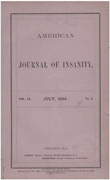Impairment of recognition memory with, but not without, conscious recollection in schizophrenia
Abstract
OBJECTIVE: To test the hypothesis that there is a link between the memory deficit associated with schizophrenia and an impairment of consciousness, an experiential approach was used to assess recognition memory and awareness in schizophrenic patients and normal subjects. METHOD: On a recognition memory task with low- and high-frequency words, the schizophrenic (N = 30) and normal (N = 30) subjects gave "remember" responses to recognized items that were accompanied by conscious recollection and "know" responses to items that were recognized on the basis of familiarity without any recollective experience. RESULTS: Schizophrenia selectively impaired recognition based on recollective experience, as measured by "remember" responses, but had no effects on "know" responses. In the comparison group, low- frequency words, relative to high-frequency words, enhanced conscious recollection but not familiarity. The schizophrenic patients did not display the same word-frequency effect. CONCLUSIONS: These results indicate that schizophrenia affects differentially two means of access to the personal past: it impairs recognition memory with, but not without, conscious recollection. They suggest that the impairment of conscious recollection observed in schizophrenic patients could be due to a failure of elaborative processing of information.
Access content
To read the fulltext, please use one of the options below to sign in or purchase access.- Personal login
- Institutional Login
- Sign in via OpenAthens
- Register for access
-
Please login/register if you wish to pair your device and check access availability.
Not a subscriber?
PsychiatryOnline subscription options offer access to the DSM-5 library, books, journals, CME, and patient resources. This all-in-one virtual library provides psychiatrists and mental health professionals with key resources for diagnosis, treatment, research, and professional development.
Need more help? PsychiatryOnline Customer Service may be reached by emailing [email protected] or by calling 800-368-5777 (in the U.S.) or 703-907-7322 (outside the U.S.).



